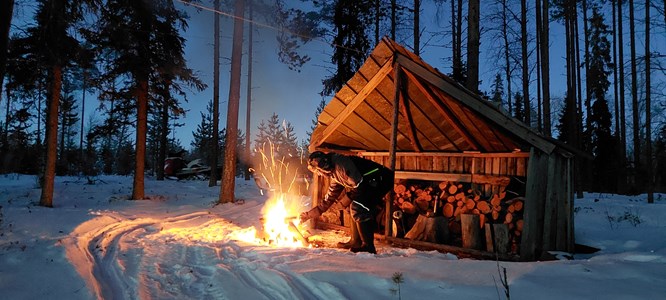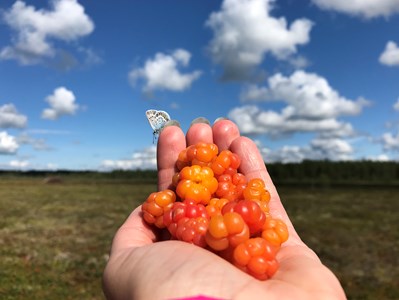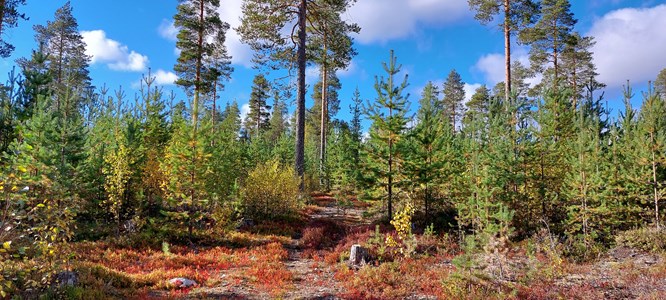Heli Rantapelkonen, a geographer and a graduate of the master’s degree programme in Northern Tourism loves to wander in the Finnish nature, especially in the forest. Her love and interest in nature led her to study geography and work as a geography and biology teacher in a Finnish school. International work was always a part of her career in one form or another and the passion for travel created in her youth never faded. She decided to study in the Northern Tourism program at the University of Lapland, as she wanted to contribute to promoting sustainable tourism. Currently, Heli works in the forest industry. In her job, she organizes a great deal of public relations visits. These are visits tailored individually to each visitor or group.
Heli hopes that by creating sustainable and high-quality visits, she can increasingly highlight the importance of our main partner, nature, to visitors, as the value of northern nature can never be overstated. She feels that by incorporating even a brief nature contact into the visit, she can teach visitors something concrete about why the northern nature is so important and meaningful to us northerners.

Photo: Heli Rantapelkonen
Read about Heli’s interesting master’s thesis in Northern Tourism:
Public relations is intertwined in the work of the organizations for creating and maintaining connections with important partners and stakeholders, for instance. One form of connecting is public relations visits that can be considered as tourism. During these short, three to five days’ visits organization representatives create and deepen their connections by meeting each other on site in an authentic local environment.
The public relations visit programmes include not only meetings within the organization but also elements of tourism including travelling and accommodation, not to forget about using remarkable share of other services like dining, guided tours, and shopping local products in local shops, for instance. These kinds of visits aiming to bring organization representatives together are organized by host organizations where employees make visit arrangements among other work thus, visit organizers are not professionals in tourism, nor providing commercial tourism services. Instead, these visits are tailored exclusively for the guests referring to organization specific goals. Hence, these visits are not just for fun, instead there are deeper meanings embedded.
Sustainable tourism is considered as tourism that takes into account ecological, sociocultural, and financial aspects, and is fulfilling the needs of tourists, livelihood, and local community without taking the possibility of fulfilling the needs of future generations. Responsible tourism aims to make better places for people to live and visit, with local people and environment being prioritized. Referring to written above, rather few earlier scientific literature talk about organizing public relations visits, and, moreover, I had rarely heard talking about sustainability or responsibility of these visits, hence I recognized a research gap in this matter.

Photo: Heli Rantapelkonen
In my qualitative, ethnographic research based on conventional content analysis of field diary, in-depth interview and memory-work, I illuminated internal practices of three public and private sector organizations in order to highlight existing practices of organizing public relations visits in Northern Finland. I find my research aspect highly interesting as within the public relations visit research the practice-based approach is rather novel: public relations visits have seldom been studied through practice-based approach.
The research shows that organizations have shared practices 1) guiding the arrangements (for example setting goals for visit, organizing the necessary events, and following the rules), 2) of providing and sharing experiences (participating on activities, sharing the experience, and meaning-making, for instance), 3) of building connections (creating new connections and nurturing them, building networks and maintaining partnerships), and 4) of internal and external communications (including communicating with colleagues inside the organization as well as with partners and expected visitors outside the organization).
According to my research findings, in organizations, there is a common will to invite guests for a visit and offer local services for them. In addition, organizations highly respect their guests, hence they are investing on organizing activities in order to provide memorable visits. Making arrangements for making happy visitors is an important task in the organizations.
However, organizations are facing challenges especially in practices of internal and external communications, which are crucial for building not only a successful, but also a sustainable and responsible visit. By communicating effectively inside and outside the organization, the open flow of information helps to tackle emerging challenges already before the visit, thus ensuring a comfortable visit experience without unwanted surprises for both the host and the visitors. Hence, organizing the public relations visits in the North in the future requires more efficient communication not only inside the host organization to achieve a seamless organizing process, but also communications outside the organization for mapping out the skills and possible cultural limitations of the guests regarding organizing the visit activities.
For increasing sustainability and responsibility of public relations visits, I also suggest including in the visit programmes at least a short visit in local nature for providing a chance to the visitors to learn in practice what is the meaning of northern nature for the local organizations, hence also for people living in the North. By doing so, there is a chance to teach the visitors in practice that northern nature forms the basis for all the livelihoods in the North and is actually a remarkable partner to us overall - the northern nature keeps surprising, delighting and inspiring us every single day.

Photo: Heli Rantapelkonen
Master’s Degree Programme in Northern Tourism is organised by the UArctic Thematic Network on Northern Tourism.
Read more about the programme here.
